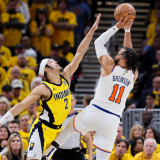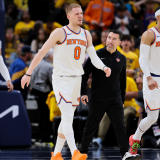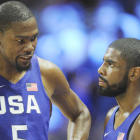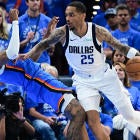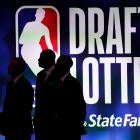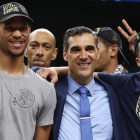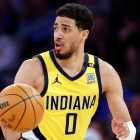From the moment Kevin Durant joined the Warriors, burying the Thunder's title hopes at the bottom of the ocean (or at least a deep lake in Oklahoma, like Broken Bow), his persona in reaction to the outrage of fans has been best summed up as "I'm not mad, honestly, I find it funny."
Durant has dismissed the very idea that anyone should have any feelings at all about his decision to join the Warriors, let alone actively criticize him. To that end, he's presented very compelling arguments that tie into ideas about the fallacy of loyalty in the NBA, player freedom and agency, and the extreme nature of fandom that spills into abuse. In interviews and appearances on the Bill Simmons Podcast, Durant has sold a version of himself which simply laughs at all those upset with his simple employment decision. I'm not going to rehash any of those arguments, they've been hashed too many times.
What's interesting, instead, is how to reconcile this in the wake of Sunday's discovery that Durant has been using alternate social media accounts, assuming third-person identities, and defending himself online with them against criticism. Now, there's a very strong likelihood that the tweets were not sent from Durant, but from someone in his crew, an assistant, a friend, a manager, who knows? It's just not very likely that a player who makes as much money as Durant does, and therefore can spend his free time literally doing nearly anything he wants, would choose to spend it making fake Twitter accounts so that he could blame all of his problems on Russell Westbrook, Billy Donovan and a roster that helped him reach the Western Conference finals four times.
However, as those accounts were mirrored accidentally on Durant's own account, and because these accounts are online avatars of ourselves, the public perception is that Durant himself is expressing these views, and that Durant himself is the one fighting with critics in a never-ending war of being #MadOnline. If nothing else, someone who is close enough to him to have access to his Twitter account took this action, and as such, it's reasonable to assume -- at least for the moment -- that Durant doesn't disagree with the sentiments expressed. (Update: Durant has since apologized for the tweets, calling them "childish" and "idiotic.")
All of this runs completely contrary to the image Durant has tried to cultivate, which is someone entirely above the fray. To be truly powerful, you have to be able to transcend the human instinct to defend yourself from criticism. Chuck Klosterman wrote in his book on villains, I Wear The Black Hat that villains are those who "know the most, but care the least." It's evident that Durant knows the most, but he also very clearly cares. If you truly don't care how people view you, you don't need to talk about it. You brush it off and you move on.
The two K.D.s
What made Durant's interviews with Simmons this summer so captivating was how casually honest and candid he seemed in how he spoke about the league, fame and basketball. They were rewarding in how they offered Durant's unfiltered, cliche-free views on these big, hot sports topics. Notice how I said he "seemed" honest and not he "was" honest. Not because Durant was purposefully lying, or putting on a show from the protected position of having won Finals MVP and a championship, but because Durant was doing the same thing in interviews that "he" was doing in these Twitter comments: projecting a version of himself.
Fans and media will criticize an athlete for being "fake" in interviews, even as we all, openly, actively engage in parlor tricks to make ourselves appear a certain way online every day. Your Instagram that only shows vacations, great food, interesting sights. Your Facebook that only shows your loving family and happy moments and not those times when the kids have driven you to the point of casually googling "basement deprivation chambers" on your phone. Your Twitter account where you are an expert on any number of subjects, pithy and engaging all at once. Athletes face this personal projection every day with the media. It is the rare journalist that gets to really know an athlete and not just what the athlete projects in their company.
Funnily enough, the most "real" part of Durant's summer was not him cursing or dishing on how athletes deserve to live lives they choose. (They do.) It's in the duality that betrayed him on Sunday with the discovery of those social media accounts, the revelation that Durant is as petty as anyone. That wasn't just shown in the fake accounts, but in how he's taken to not only Twitter, but YouTube comments to interact with fans. Think about that. Durant makes $25 million per year, and is on YouTube, clapping back at folks.
Durant, since leaving high school, has never been more "one of us" -- the average, every-day, non-famous people -- more than now when he is trying to be two people at once: the too-cool megastar blowing off criticism and mocking reporters ... and the thin-skinned kid-dude who finally achieved his life-long goals of NBA success and still feels the need to be that guy from the XKCD comic staying up to battle someone who's wrong on the internet. The "real" Kevin Durant he put forward in interviews doesn't ring as true as that version of himself mixed with guy who thinks people should stop saying things he thinks are dumb online.
Then, there's Kyrie Irving.
The Kyrie Irving heel turn
While Durant was being revealed as the would-be villain who cares too much, Irving was essentially cutting a wrestling promo on ESPN's "First Take."
The 25-year-old flat-Earth-believing, iso-balling, burgeoning movie star Boston Celtic went on a morning debate program and:
- belittled host Max Kellerman's line of questioning about nine times
- indicates he was hurt that the information about his trade request was leaked, which seemed awfully pointed in LeBron James' direction
- replied "Yeah." when told James might take it personally Irving never spoke to him about his trade request
- proceeded to say he did not care if James took that personally
- would not affirmatively say that James is a better player than Durant right now
Had Irving spit a catch phrase, walked off, then came back and hit Stephen A. Smith with a metal chair, it would have been straight out of a Ric Flair or Brian Pillman segment on "Monday Night Raw."
If you want a villain who knows the most and cares the least? As long as we're not talking the laws of planetary physics, Irving has firmly gotten there. Not only did he turn his back on one of the greatest players of all time in pursuit of his own individual success, he also managed to secure a trade to the team that has been James' longest-running rival, the second-best team in the East and did so under the cover of darkness. On top of that, the interview showed a wanton disregard for what anyone thinks about it. Why should Irving tell his teammate he's asking out? Why should he care what his teammate thinks about it?
This isn't about whether you agree with Irving's positions on the matters or not; again, like with Durant, how you feel about Irving's decisions is far less interesting than how we collectively feel about his public persona. Irving is not presenting two sides of the coin. He is not chasing down online critics. Irving has been filming a movie about a fictional, old-man version of himself in Atlanta before this interview. Irving at this point is more myth than man in the public eye. Even Irving's non-public time is spent in alternate identities.
This is the same Kyrie Irving who once skipped out on Fan Appreciation Night, the same guy who has embraced Kobe Bryant as a mentor and idol. Bryant's entire sports ethos was about a wanton disregard for anything that got in the way of a player's personal pursuits. Irving is prepared for a villain role, because his approach isn't "Yes, I did something you might not like, but you have to respect it because ..." His position is "I'm not willing to engage you on this because you are not worth my time." (Time, which, by the way, is not determined by the rotation of a round Earth around the sun.)
Every story needs a villain
(A preface: none of these players are actually villains. There are real villains in the world and they are not fun, to talk about or experience. These are just pro athletes who play a game in the public eye.)
This summer has shown like never before that the NBA is a soap opera, a drama, and even villains have fans in such mediums. People love a good villain. The Warriors really wanted to embrace the super-villain persona last year, to the point of literally wearing shirts with the phrase "Super-Villains" on it, but it never really took. Draymond Green? Sure. But the rest of Golden State aren't invested enough in disregarding convention or public sentiment.
Irving will have fans who support this approach, who embrace him for this identity; like I said, people love a good villain. Irving will actually face less backlash than Durant, because Durant's persona being revealed as multi-faceted feels inconsistent, even if most people are the same way. Irving's position feels more consistent. He's not asking for love, he's demanding respect. Durant's earned that respect, no doubt, but ironically, the fact that he cares about the criticism fuels it even more.
What all of these events are really about is the complicated nature of how players create public identities, which are shades of who they really are, and which takes a real commitment to maintain. In modern parlance, that's called "building a brand," but it's more subtle than that. This week Durant showed a more full side of his persona, something more honest, and Irving stepped fully into an identity that shows conventional geography isn't the only thing he doesn't care about.
As always, the NBA remains ahead of the pack when it comes to drama, and its athletes' close relationship with the public, through the lens of whatever identity they create.









